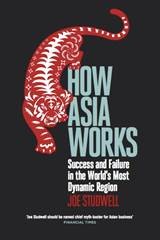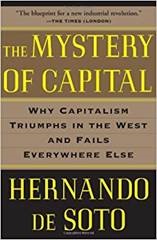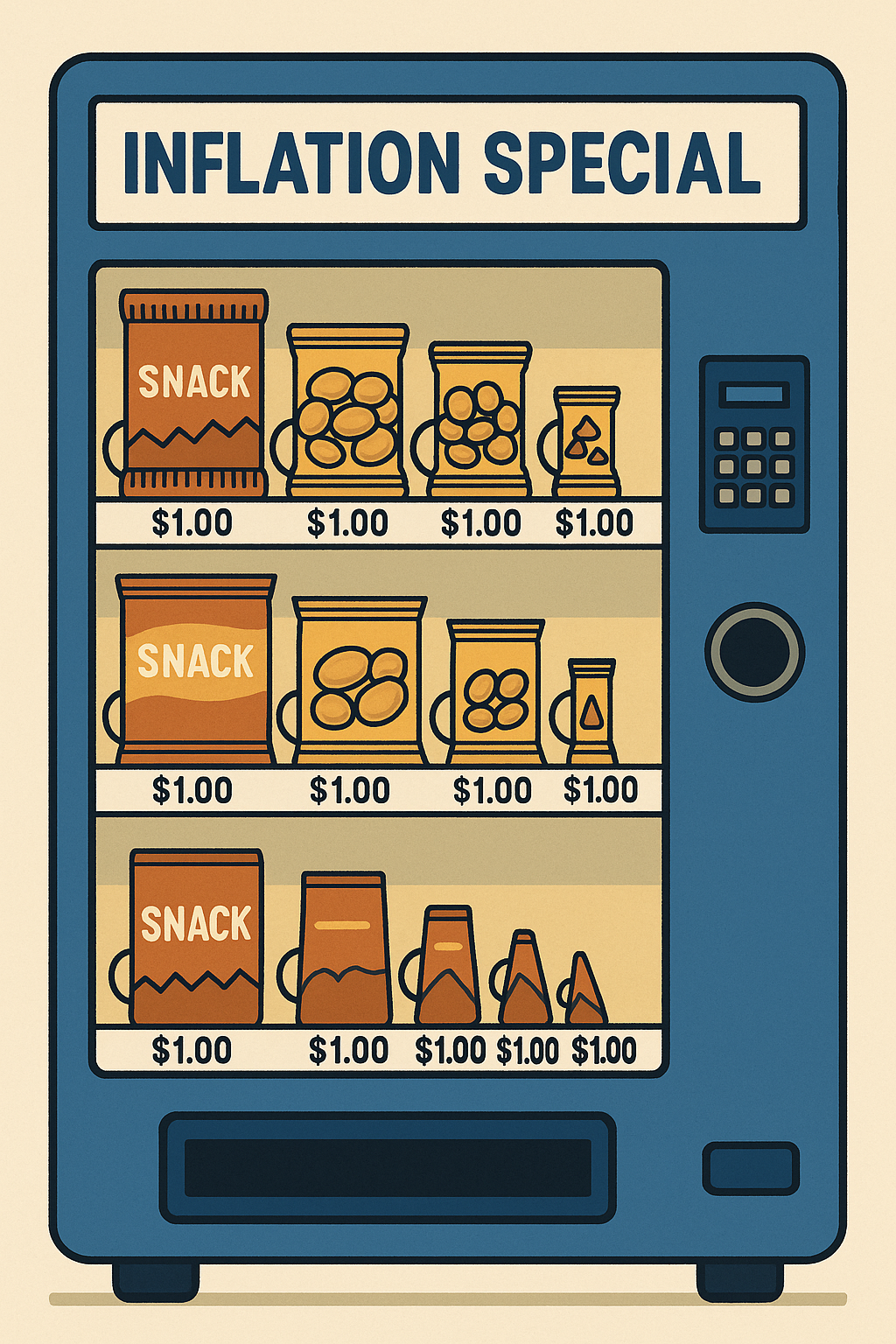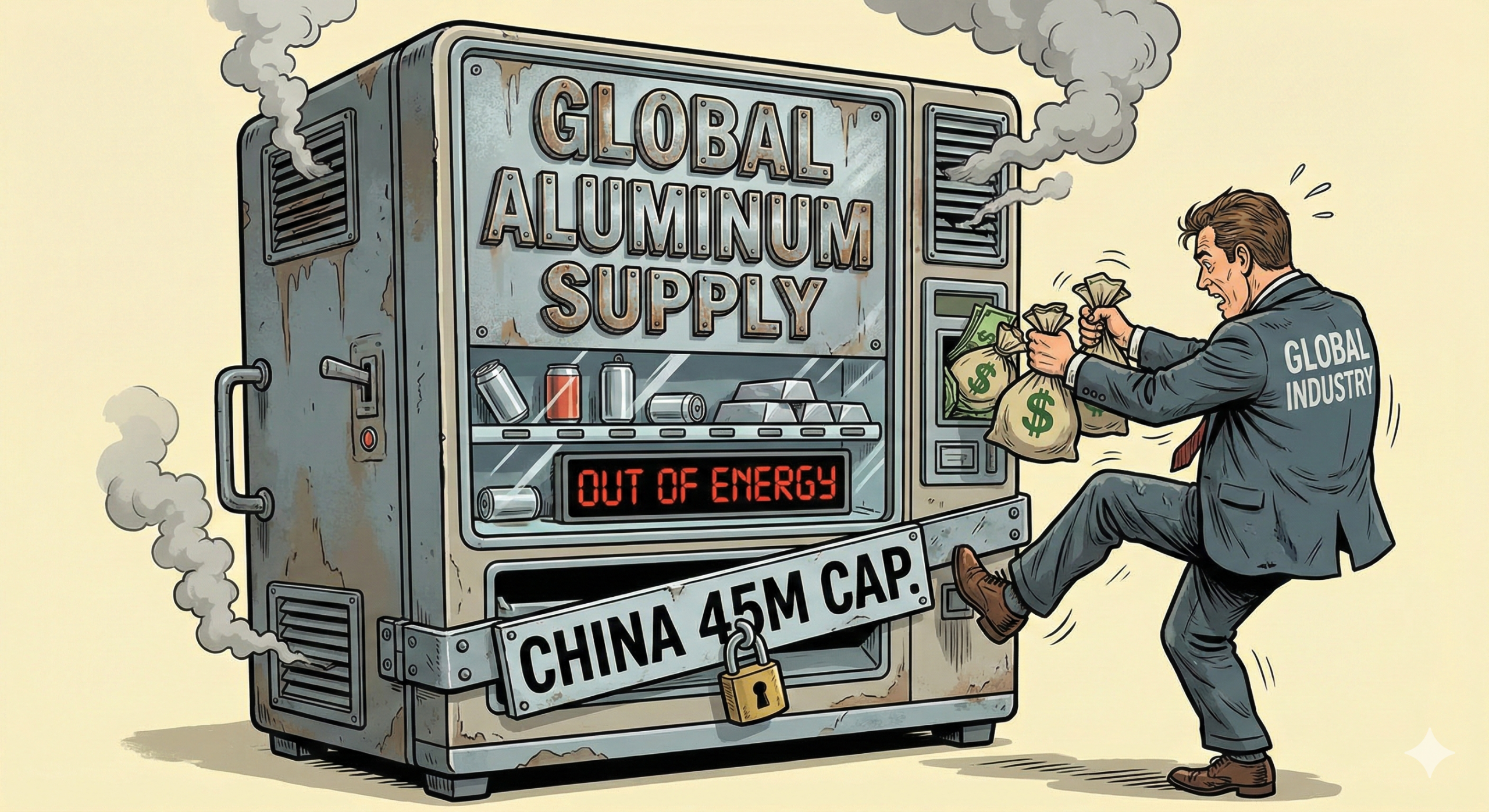No title no glory
No title no glory
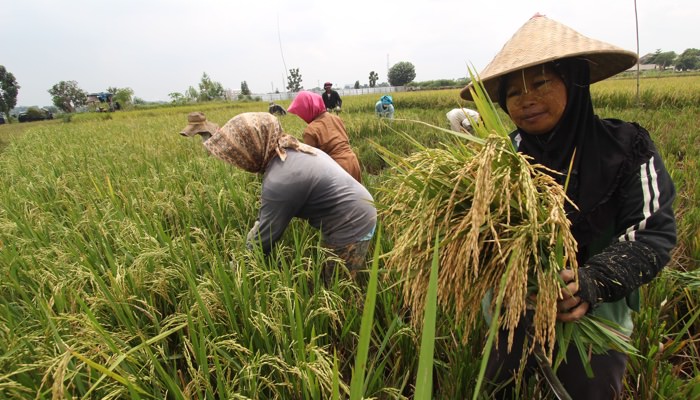

In our fourth quarter 2015 report, we referred to a book titled “How Asia Works” by Joe Studwell. In this insightful book, the author pointed out that with most resources often being concentrated in agriculture, this sector offers poor countries the most direct and immediate opportunity to increase economic output. Yet, (concentrated) land ownership by landlords is often preventing tenant farmers from creating wealth for themselves. For this reason, it is important that land ownership is not too concentrated and that farmer can obtain legal title to the land they farm. Besides increasing farmers’ income, this has also proven to increase production output.
In addition to having a better sense of ownership, farmers can use the legal title to their land to obtain funding for production inputs such as seeds, fertilisers, beasts of burden and machinery. In return, enabling farmers to create wealth initiates a virtuous circle such as higher productivity, higher consumer good demand, better trade balance, and more room for industrial investments.
The importance of land ownership is also stressed in the book “The Mystery of Capital: Why Capitalism Triumphs in the West and Fails Everywhere Else” written by the Peruvian economist Hernando de Soto. The author argues that the major stumbling block that keeps the world outside the West from benefiting from capitalism, is its inability to produce capital.
However, de Soto’s extensive research(block by block and farm by farm) in Asia, Africa, the Middle East, and Latin America suggests that most of the poor already possess the assets they need to make a success of capitalism. Even in the poorest countries, the poor save money.
Yet, they hold these resources in defective forms: houses built on land for which ownership rights are not adequately recorded, unincorporated businesses with undefined liability, industries located in areas where financiers and investors cannot see them.
Because the rights to these possessions are not adequately documented, these assets cannot readily be turned into capital, cannot be traded outside of a narrow local circle where people know and trust each other, cannot be used as collateral for a loan, and cannot be used as a share against an investment.
The world outside the West lacks the representational process that allows every parcel of land, every building, every piece of equipment, is represented in a property document. This is the sign of vast hidden process connects all these assets to the rest of the economy. They have houses and land but no titles; crops but no deeds; business but not statutes of incorporation. It is the unavailability of these essential representations that explains why many parts outside the West have not been able to produce sufficient capital to make their domestic capitalism works.
Indonesian government making crucial steps in support of farmers
The administration of President Jokowi appears to agree that agriculture and land reforms are an important stepping stone to Indonesia’s transformation, as the Indonesian land reform program is about to gain momentum.
We have been writing extensively about the agrarian and farming reform programs as being one of the key pillars for the Jokowi administration.
According to data from the Indonesian Coordinating Minister for Economic Affairs, at least 5 million farmer households left the agricultural sector between 2003 and 2013. These people moved to jobs in the informal sector, working in urban areas and abroad. Many farmers who remain in the agricultural sector either own relatively small plots of land or have sold all the land that they owned. This resulted in a low rate of land ownership among the farmers.
President Jokowi is about to redistribute assets and further reform the agrarian sector. The government will begin distributing concessions to the (indigenous) people, cooperatives, and Islamic schools, as well as distributing land certificates to communities.
The size of the land that is to be redistributed is staggering. Currently, the Environment and Forestry Ministry and the National Land Agency are respectively earmarking 12.7 million and 9 million hectares, to support the program. To put this into perspective, the total land to be re-distributed, i.e. 21.7million ha is even bigger than the current total paddy and corn harvest area combined (19.2mn ha). Assuming that all the distributed land will be used to plant rice and corn, the wealth creation would be around some US$ 40 billion (4.6% of Indonesia GDP), just from agriculture output alone.
In support of the land redistribution scheme, the national land agency (BPN) under the Agrarian and Spatial Planning Ministry aims to issue 5 million land ownership certificates this year, while the goals for 2018 and 2019 are 7 million and 9 million certificates, respectively. They have issued about 250,000 land ownership certificates per May 2017. If this program will be executed according to plan, all the land in this country will be registered by 2025.
To support the redistribution of the land, the government plans to introduce the draft land bill (the first bill to support the Agrarian Law) into the House of Representative in the first week of June 2017 for deliberation. The bill would provide legal certainty on land rights such as the right to use (HGU) and rights to build (HGB) and to introduce new concepts such as rights to the earth below a plot of land called subterranean rights. With the land redistribution program and agrarian reforms, President Jokowi provides a way for people to provide secure collateral to the banks.
Heyokha has validated the progress on the ground…
Our post sell-side experience gives us a new meaning to the words “off the beaten track”. We trust that embarking on a journey of discovery and getting our feet dirty provides us with unique first-hand experiences. This allows us to discover new ideas or angles for our investment thesis.
During our trip to West Nusa Tenggara province in Indonesia in the third quarter of 2016, for example, we witnessed how the regent of Dompu (in West Nusa Tenggara), Bambang Yasin, embarked on a program to allow farmers to convert “forest land” into farmland so that they can plant corn.
Together with a pro-farmer infrastructure build-up, the corn planting program transformed the poor Dompu into a high growth area. With this corn belt program, the poverty rate was reduced from 23% in 2010 to only 12% in 2015. Click here for our 3Q 2016 report.
Moreover, during an earlier trip to the fishing villages in Kendal, Central Java, we learned that the Jokowi government has been speeding up the process of granting land certificates to the fishermen as well.
…and we have high expectations about the results
We also learn from attending a recent presentation by the Minister of Villages, Disadvantaged Regions and Transmigration, Mr Eko Putro Sandjojo that 82% of the villages in Indonesia rely on agriculture. As such, it is safe to assume that a solution aimed at making villages prosperous would need to back farmers.
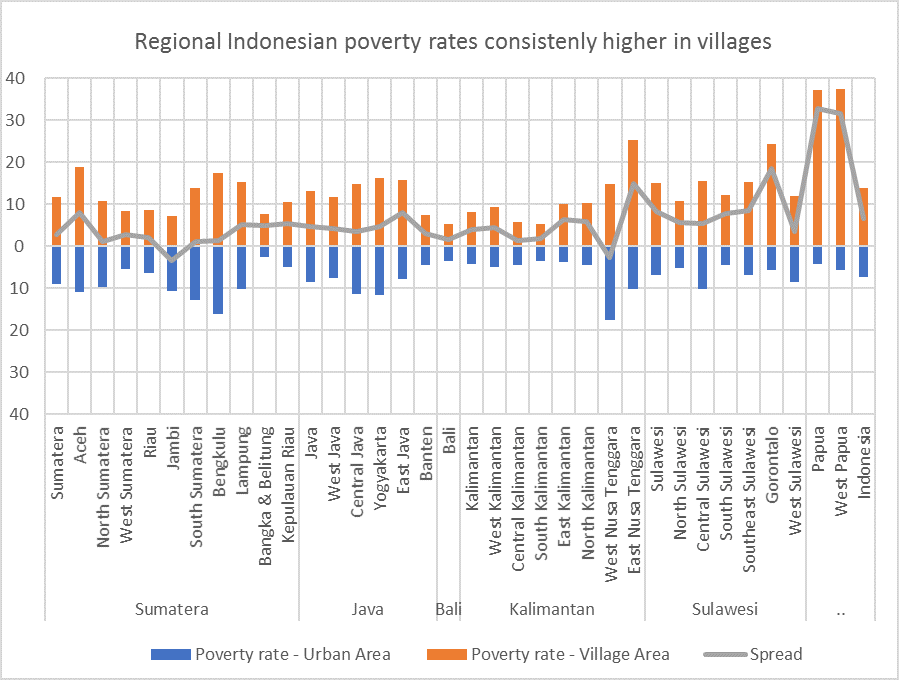
Source: Ministry of Village, Disadvantage Region, and Transmigration
Note: In general, poverty rates are significantly higher in villages as compared to urban areas (14% in village vs. 7.4% in rural). We think that income inequality can be reduced by agriculture and agrarian reforms.
After providing a lot of supports for farmers, the government is now working on the crucial part of the agri puzzle, i.e. access to land and legal title of the land. We expect this to translate into better capital formation and increasing farmers’ productivity.
The Dompu case described above is a good proof of concept to significantly increase employment and wealth. Copy and paste this across Indonesia and imagine what can happen.
Admin heyokha
Share
In our fourth quarter 2015 report, we referred to a book titled “How Asia Works” by Joe Studwell. In this insightful book, the author pointed out that with most resources often being concentrated in agriculture, this sector offers poor countries the most direct and immediate opportunity to increase economic output. Yet, (concentrated) land ownership by landlords is often preventing tenant farmers from creating wealth for themselves. For this reason, it is important that land ownership is not too concentrated and that farmer can obtain legal title to the land they farm. Besides increasing farmers’ income, this has also proven to increase production output.
In addition to having a better sense of ownership, farmers can use the legal title to their land to obtain funding for production inputs such as seeds, fertilisers, beasts of burden and machinery. In return, enabling farmers to create wealth initiates a virtuous circle such as higher productivity, higher consumer good demand, better trade balance, and more room for industrial investments.
The importance of land ownership is also stressed in the book “The Mystery of Capital: Why Capitalism Triumphs in the West and Fails Everywhere Else” written by the Peruvian economist Hernando de Soto. The author argues that the major stumbling block that keeps the world outside the West from benefiting from capitalism, is its inability to produce capital.
However, de Soto’s extensive research(block by block and farm by farm) in Asia, Africa, the Middle East, and Latin America suggests that most of the poor already possess the assets they need to make a success of capitalism. Even in the poorest countries, the poor save money.
Yet, they hold these resources in defective forms: houses built on land for which ownership rights are not adequately recorded, unincorporated businesses with undefined liability, industries located in areas where financiers and investors cannot see them.
Because the rights to these possessions are not adequately documented, these assets cannot readily be turned into capital, cannot be traded outside of a narrow local circle where people know and trust each other, cannot be used as collateral for a loan, and cannot be used as a share against an investment.
The world outside the West lacks the representational process that allows every parcel of land, every building, every piece of equipment, is represented in a property document. This is the sign of vast hidden process connects all these assets to the rest of the economy. They have houses and land but no titles; crops but no deeds; business but not statutes of incorporation. It is the unavailability of these essential representations that explains why many parts outside the West have not been able to produce sufficient capital to make their domestic capitalism works.
Indonesian government making crucial steps in support of farmers
The administration of President Jokowi appears to agree that agriculture and land reforms are an important stepping stone to Indonesia’s transformation, as the Indonesian land reform program is about to gain momentum.
We have been writing extensively about the agrarian and farming reform programs as being one of the key pillars for the Jokowi administration.
According to data from the Indonesian Coordinating Minister for Economic Affairs, at least 5 million farmer households left the agricultural sector between 2003 and 2013. These people moved to jobs in the informal sector, working in urban areas and abroad. Many farmers who remain in the agricultural sector either own relatively small plots of land or have sold all the land that they owned. This resulted in a low rate of land ownership among the farmers.
President Jokowi is about to redistribute assets and further reform the agrarian sector. The government will begin distributing concessions to the (indigenous) people, cooperatives, and Islamic schools, as well as distributing land certificates to communities.
The size of the land that is to be redistributed is staggering. Currently, the Environment and Forestry Ministry and the National Land Agency are respectively earmarking 12.7 million and 9 million hectares, to support the program. To put this into perspective, the total land to be re-distributed, i.e. 21.7million ha is even bigger than the current total paddy and corn harvest area combined (19.2mn ha). Assuming that all the distributed land will be used to plant rice and corn, the wealth creation would be around some US$ 40 billion (4.6% of Indonesia GDP), just from agriculture output alone.
In support of the land redistribution scheme, the national land agency (BPN) under the Agrarian and Spatial Planning Ministry aims to issue 5 million land ownership certificates this year, while the goals for 2018 and 2019 are 7 million and 9 million certificates, respectively. They have issued about 250,000 land ownership certificates per May 2017. If this program will be executed according to plan, all the land in this country will be registered by 2025.
To support the redistribution of the land, the government plans to introduce the draft land bill (the first bill to support the Agrarian Law) into the House of Representative in the first week of June 2017 for deliberation. The bill would provide legal certainty on land rights such as the right to use (HGU) and rights to build (HGB) and to introduce new concepts such as rights to the earth below a plot of land called subterranean rights. With the land redistribution program and agrarian reforms, President Jokowi provides a way for people to provide secure collateral to the banks.
Heyokha has validated the progress on the ground…
Our post sell-side experience gives us a new meaning to the words “off the beaten track”. We trust that embarking on a journey of discovery and getting our feet dirty provides us with unique first-hand experiences. This allows us to discover new ideas or angles for our investment thesis.
During our trip to West Nusa Tenggara province in Indonesia in the third quarter of 2016, for example, we witnessed how the regent of Dompu (in West Nusa Tenggara), Bambang Yasin, embarked on a program to allow farmers to convert “forest land” into farmland so that they can plant corn.
Together with a pro-farmer infrastructure build-up, the corn planting program transformed the poor Dompu into a high growth area. With this corn belt program, the poverty rate was reduced from 23% in 2010 to only 12% in 2015. Click here for our 3Q 2016 report.
Moreover, during an earlier trip to the fishing villages in Kendal, Central Java, we learned that the Jokowi government has been speeding up the process of granting land certificates to the fishermen as well.
…and we have high expectations about the results
We also learn from attending a recent presentation by the Minister of Villages, Disadvantaged Regions and Transmigration, Mr Eko Putro Sandjojo that 82% of the villages in Indonesia rely on agriculture. As such, it is safe to assume that a solution aimed at making villages prosperous would need to back farmers.

Source: Ministry of Village, Disadvantage Region, and Transmigration
Note: In general, poverty rates are significantly higher in villages as compared to urban areas (14% in village vs. 7.4% in rural). We think that income inequality can be reduced by agriculture and agrarian reforms.
After providing a lot of supports for farmers, the government is now working on the crucial part of the agri puzzle, i.e. access to land and legal title of the land. We expect this to translate into better capital formation and increasing farmers’ productivity.
The Dompu case described above is a good proof of concept to significantly increase employment and wealth. Copy and paste this across Indonesia and imagine what can happen.
Admin heyokha
Share

